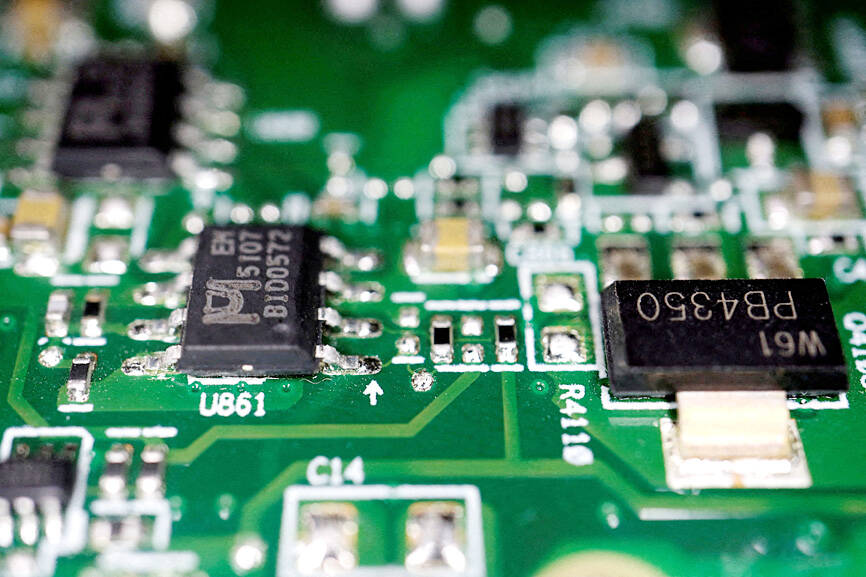The production value of Taiwan’s printed circuit board (PCB) industry is expected to return to yearly growth of 6.3 percent this year, backed by robust demand for advanced PCBs used in artificial intelligence (AI) applications and electric vehicles (EV), the Taiwan Printed Circuit Association said yesterday.
A pickup in the mobile phone, computer and semiconductor sectors would also help boost demand, the association said.
Overall production value of local PCB companies is forecast to expand to NT$818.2 billion (US$25.51 billion), compared with NT$769.8 billion last year, it said.

Photo: Reuters
“The trickle of AI applications into edge devices from cloud-based devices will stimulate demand for advanced PCBs this year,” the association said.
Demand for PCBs used in vehicles would continue to grow this year amid Beijing’s push for higher EV penetration in China and EV makers’ aggressive overseas deployments, the association said.
Last year, the production value of PCBs used in vehicles increased 2.8 percent annually, the only growth segment of the year, it said.
With PCB materials and manufacturing equipment included, the association said it expects the production value of the local PCB supply chain to advance 7.4 percent to NT$1.21 trillion this year.
Local PCB manufacturers’ total production value contracted 16.7 percent last year from a peak of NT$900 billion in 2022 as customers balked at placing new orders, the association said.
The three major PCB applications — communications, PCs and semiconductors — all dipped last year as high inflation, tight monetary policy and economic uncertainty dealt a severe blow to demand, it said.
Zhen Ding Technology Holding Ltd (臻鼎), the world’s largest PCB maker, last month told investors that the worst was over and that it expects its revenue to grow by a double-digit percentage this year.
Zhen Ding Technology Holding’s revenue last year dropped 11.55 percent to NT$151.56 billion from a year earlier.
On Monday, the company announced that it is to expand its production lines in China’s Shenzhen with an investment of 700 million yuan (US$96.74 million) in light of rising demand for consumer electronics and vehicles.
The company is also investing in a new production line in Kaohsiung to produce flexible PBCs and advanced PCB modules starting in the second half of this year, and plans to expand capacity in Thailand with a pilot run in the second half of next year, it said.
Taiwanese PCB manufacturers have continued to expand in Southeast Asian nations such as Thailand, Malaysia and Vietnam to cope with geopolitical tensions, but those production lines were still only a small portion, 2.7 percent, of their total production value in the fourth quarter of last year, the association said.
Taiwan contributed 31.7 percent to PCB makers’ total production value, behind China at 65.6 percent, it said, adding that China would remain a major PCB manufacturing hub.

Application-specific integrated circuit designer Faraday Technology Corp (智原) yesterday said that although revenue this quarter would decline 30 percent from last quarter, it retained its full-year forecast of revenue growth of 100 percent. The company attributed the quarterly drop to a slowdown in customers’ production of chips using Faraday’s advanced packaging technology. The company is still confident about its revenue growth this year, given its strong “design-win” — or the projects it won to help customers design their chips, Faraday president Steve Wang (王國雍) told an online earnings conference. “The design-win this year is better than we expected. We believe we will win

Intel Corp chief executive officer Lip-Bu Tan (陳立武) is expected to meet with Taiwanese suppliers next month in conjunction with the opening of the Computex Taipei trade show, supply chain sources said on Monday. The visit, the first for Tan to Taiwan since assuming his new post last month, would be aimed at enhancing Intel’s ties with suppliers in Taiwan as he attempts to help turn around the struggling US chipmaker, the sources said. Tan is to hold a banquet to celebrate Intel’s 40-year presence in Taiwan before Computex opens on May 20 and invite dozens of Taiwanese suppliers to exchange views

Chizuko Kimura has become the first female sushi chef in the world to win a Michelin star, fulfilling a promise she made to her dying husband to continue his legacy. The 54-year-old Japanese chef regained the Michelin star her late husband, Shunei Kimura, won three years ago for their Sushi Shunei restaurant in Paris. For Shunei Kimura, the star was a dream come true. However, the joy was short-lived. He died from cancer just three months later in June 2022. He was 65. The following year, the restaurant in the heart of Montmartre lost its star rating. Chizuko Kimura insisted that the new star is still down

While China’s leaders use their economic and political might to fight US President Donald Trump’s trade war “to the end,” its army of social media soldiers are embarking on a more humorous campaign online. Trump’s tariff blitz has seen Washington and Beijing impose eye-watering duties on imports from the other, fanning a standoff between the economic superpowers that has sparked global recession fears and sent markets into a tailspin. Trump says his policy is a response to years of being “ripped off” by other countries and aims to bring manufacturing to the US, forcing companies to employ US workers. However, China’s online warriors